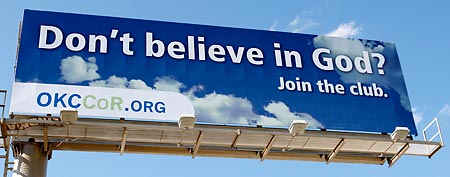 Atheists hold massive rally in DC
Atheists hold massive rally in DCSome of the biggest voices from the movement headlined this weekend's event because atheism is growing." Thousands of atheists, agnostics, skeptics, and unbelievers turned out in the US capital on Saturday (March 24, 2012) at the National Mall in Washington, DC to celebrate their rejection of the idea of God, gods, superstition, and the unseen. They were there to claim a bigger place for reason, rationality, and science in public discourse.
Buddhists are atheists, right?
Wisdom Quarterly No, Buddhists are whatever they want to be. Buddhism is nontheistic, not to be confused with atheism. Theism is faith, belief, certainty, or reliance on some supernatural creator, controller, or savior. Atheism is the unfounded certainty that there is no such thing.
No, Buddhists are whatever they want to be. Buddhism is nontheistic, not to be confused with atheism. Theism is faith, belief, certainty, or reliance on some supernatural creator, controller, or savior. Atheism is the unfounded certainty that there is no such thing.
Agnosticism is not being sure or at least not committing so either view. Nontheism, on the other hand, is the position that it does not matter. Whether or not there are gods, that does not really have much bearing on one's attainment of enlightenment (permanent emancipation, liberation, salvation).
 But if "salvation" is interpreted simply as rebirth in one of the many space (heavenly, celestial) worlds, such belief may be useful. There are many devas (shining ones, light beings) and brahmas (powerful divinities), as well as a host of other types of living beings -- beneficial, harmful, mixed, and indifferent toward humans.
But if "salvation" is interpreted simply as rebirth in one of the many space (heavenly, celestial) worlds, such belief may be useful. There are many devas (shining ones, light beings) and brahmas (powerful divinities), as well as a host of other types of living beings -- beneficial, harmful, mixed, and indifferent toward humans.
Female light beings (devis) exist just as male ones (devas) do, but brahmas transcend sexuality; therefore, "God" is neither male nor female, whereas the gods (demigods, alien visitors, lords, rulers) are just like the Greek and Roman pantheons describe them -- mischievous and petty superhumans absorbed in play, pleasure, and vanity. They are better thought of as "angels" and spirits. The word deva is extremely broad in meaning, including unseen beings dwelling in forests, lower superhuman sensual words, and worlds superior to the brahmas as well.
The belief that a creator God brought life, the universe, and everything into existence -- or the idea that some being oversees, decides, and wills all that happens -- is a wrong view (miccha ditthi). However, the belief that everything is due to random chance or that existence ends at death, or that there is no world to come, these too are wrong views. And so it is said, Buddhists may believe what they like or what comforts them. But Buddhism is nontheistic.
 Is the Buddha God? No, a buddha (supremely enlightened one) is a teacher. Karmically profitable and karmically unprofitable actions are the willed deeds of a living being, and we ourselves have the power to leave them undone. So good and bad depend on us not God or the gods. We ourselves must make the effort to understand and overcome the three causes of all suffering: craving, aversion, and ignorance.
Is the Buddha God? No, a buddha (supremely enlightened one) is a teacher. Karmically profitable and karmically unprofitable actions are the willed deeds of a living being, and we ourselves have the power to leave them undone. So good and bad depend on us not God or the gods. We ourselves must make the effort to understand and overcome the three causes of all suffering: craving, aversion, and ignorance.
By ourselves is wrong done;
By ourselves we pain endure.
By ourselves we cease from ill;
By ourselves become we pure.
No one can save us but ourselves;
No one can and no one may.
We ourselves must walk the path,
Buddhas only point the way.
(Dhammapada 165)
